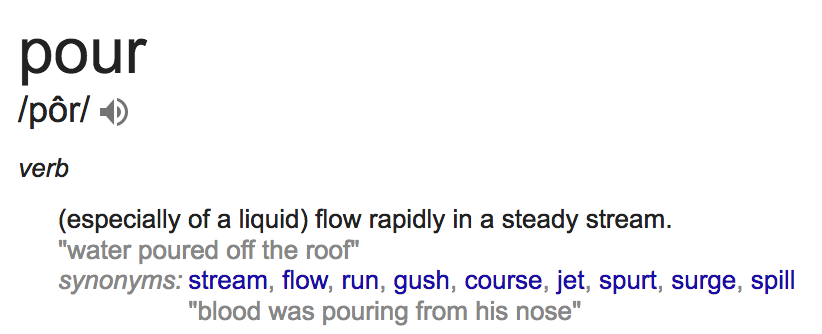
It occurred to me sometime ago that when we pour something we’re not actually pouring anything. Instead, we’re pulling the rug out from under the liquid, and thereby allowing gravity to do its work. To put it another way, pouring water — which makes us think that the action is all about the moving liquid — actually entails us removing the obstacle to gravity.
Instead, we’re pulling the rug out from under the liquid, and thereby allowing gravity to do its work. To put it another way, pouring water — which makes us think that the action is all about the moving liquid — actually entails us removing the obstacle to gravity.
“Tilting the bucket” would be a more accurate was to describe what’s going on, thereby keeping our eye on the change in the container (and then also the changer!) rather than focusing on that which is leaving it, no?
In other words, our folk conception of the activity entails seeing the liquid as moving, as leaving the glass, when it is more accurate to see the glass as tilting out from underneath the static liquid, causing the now unsupported water to, well, just fall.
Why is this worth thinking about?
It seems to me to be a nice little e.g. — a critical thinking exercise, if you will — in how we attribute agency to things in the world while failing to see it as just that: our attribution. For the water pours (the verb qualifies the noun “water,” after all, as if it is doing something) only because we tilted the bucket, causing the world to drop out from under some unsuspecting liquid.
And the water, helplessly, tumbles earthward.
So it’s not that the water rushes to the edge but that the edge disappears and the liquid has no place to go but out and over.
The water is therefore a passive actor in all this — actually, it’s not even an actor at all. It’s us doing all the work.

Sure, I could get all fancy and end by relating this to, say, the way readers conjure up authors and attribute their own meanings to them, or the way observers ask the questions they want and then place great stock in the answers they elicit, as if they were spontaneously offered by the people we’re studying, but I’ll stick with the bucket for now and leave it to you to mull over if this shift in focus is applicable anywhere else.
